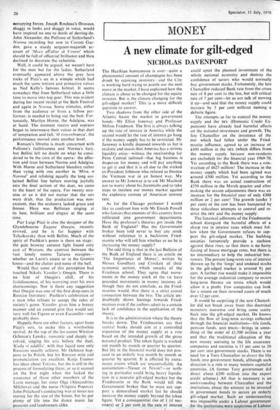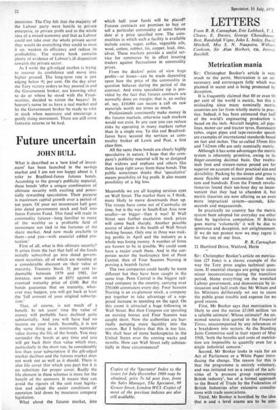MONEY A new climate for gilt-edged
NICHOLAS DAVENPORT
The Heathian honeymoon is over—quite a phenomenal amount of champagne has been drunk by rejoicing investors—and the City is working hard trying to puzzle out the next move in the market. I have explained how the climate is about to be changed for the equity investor. But is the climate changing for the gilt-edged market? This is a more difficult question to answer.
Two shadows from the other side of the Atlantic haunt the market in government bonds—Mr Elliot Janeway and Proiessor Milton Friedman. The first is always talking up the rate of interest in America while the second would let the rate of interest go hang if the money supply has to be restricted. Mr Janeway is kindly disposed towards us but is realistic and insists that America has a serious liquidity crisis—witness the receivership for Penn Central railroad—that big business is desperate for money and will pay anything to get it and that it is all due to the wicked ex-President Johnson who refused to finance the Vietnam war in an honest way. My answer to Mr Janeway is to ask Mr Macleod not to worry about his Jeremiahs and to take steps to insulate our money market against the explosive current of American interest rate.
As for the Chicago professor I would like to confront him with Mr Enoch Powell who fancies that enemies of this country have infiltrated into government departments. Have the professor's theories got inside the Bank of England? Has the Government broker been told never to buy any stock without reference to a backroom Fried- manite who will tell him whether or no he is increasing the money supply?
The odd thing is that in the last Bulletin of the Bank of England there is an article on 'The Importance of Money', written by Messrs Goodhart and Crockett of their economic section, which smacks of the Friedman school. They agree that move- ments in the money stock of the UK have preceded movements in money incomes al- though they do not conclude, as the Fried- manites would, that there is a strict causal connection between the two. The article un- doubtedly shows leanings towards Fried- manism even if the authors admit to a certain lack of confidence in the application of the theory.
It is in the administration where the theory breaks down. The Friedmanites say that central banks should aim at a controlled expansion of the money supply at a rate based on the intended growth of the gross national product. The token figure is worked out month by month or quarter by quarter. But life in the financial world- does not pro- ceed in an orderly way month by month or quarter by quarter. It is affected by extra- neous events which are uncontrollable. An assissination—Nasser or Nixon?—or noth- ing in particular could bring heavy liquida- tion in a neurotic gilt-edged market but the Friedmanite at the Bank would tell the Government broker that he must not sup- port a demoralised market lest he should increase the money supply beyond the token figure. Yet a consequential rise of 1 (if nec- essary) or 2 per cent in the rate of interest
could upset the planned investment of the whole national economy and destroy the confidence of savers who would normally buy government stocks. Fortunately, the late Chancellor reduced Bank rate from the crises rate of 8 per cent to the less, but still critical rate of 7 per cent—let us not talk of moving it up—and said that the money supply could increase by 5 per cent without naming a definite figure.
The attempts so far to control the money supply and the DCE (Domestic Credit Ex- pansion) have already had harmful effects on the national investment and growth. The late Chancellor on the insistence of the IMF which had fallen under the Fried- manite influence; agreed to an increase of £400 million in the ocE (which differs from the money supply because non-residents are excluded) for the financial year 1969-70. Yet according to the Bank there was a con, traction of £625 million! The increase in the money supply which had been agreed was around £500 million. Yet according to the Bank there was an actual contraction of £550 million in the March quarter and after making the season adjustments there was an increase for the financial year of only £300 million or 2 per cent! The growth (under 3 per cent) of the GNP has been hampered by these ridiculous attempts to control and re- strict the DCE and the money supply.
The fanatical adherents of the Friedmanite school disregard the harmful effects of a sharp rise in interest rates which must fol- low when the Government refuses to sup- port the gilt-edged market. The building societies fortunately provide a cushion a,gainst these rises, so that there is no hasty raising of house mortgage rates, but there is no intermediary to help the industrial bor- rowers. The present long-term rate of interest thrown up by the 'longs' and undated stocks in the gilt-edged market is around 9+ per cent. A further rise would make it impossible for the average industrial company to secure long-term finance on terms which would allow it a profit. Few companies can look for a return on their invested assets of much over 12 per cent.
It would be surprising if the new Chancel- lor did not break away from this doctrinal monetary nonsense and bring some sanity back into the gilt-edged market. He knows that the flow of long-term savings collected through the financial institutions—life funds, pension funds, unit trusts—brings in some- thing of the order of £1,500 million a year and that the traditional allocation of the new money accruing to the life assurance companies and societies is 15 per cent to 20 per cent into government stocks. There is no need for a Tory Chancellor to-direct the life funds into government bonds, although such direction is a rule in many western capitalist countries. (A former Tory government did direct about £200 million into the export credit scheme.) All that is necessary is an understanding between Chancellor and the institutions about the amount to be invested in government bonds to secure an orderly gilt-edged market. Such an understanding was impossible under a Labour government for the institutions were suspicious of Labour intentions. The City felt that the majority of the Labour party were hostile to private enterprise, to private profit and to the whole idea of a mixed economy and that as Labour could not take over the whole private sector they would do everything they could to mess it up, weaken its efficiency and reduce its profitability. The statute book contains plenty of evidence of Labour's ill disposition towards the private sector.
As I write the gilt-edged market is trying to recover its confidence and move into higher ground. The long-term rate is just edging below 94- per cent. On the day after the Tory victory orders to buy poured in and the Government broker, not knowing what to do or where he stood with the Fried- manites, decided to ration the buyers! In heaven's name let us have a real market and let the Government broker be ready to take in stock when necessary and encourage a gently rising movement. There are still some fantastic returns to be had.































 Previous page
Previous page